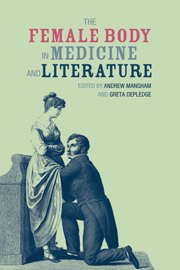Book contents
- Frontmatter
- Contents
- Acknowledgments
- Notes on Contributors
- 1 Introduction
- 2 ‘Difficulties, at present in no Degree clear'd up’: The Controversial Mother, 1600–1800
- 3 Monstrous Issues: The Uterus as Riddle in Early Modern Medical Texts
- 4 Surveilling the Secrets of the Female Body: The Contest for Reproductive Authority in the Popular Press of the Seventeenth Century
- 5 ‘Made in Imitation of Real Women and Children’: Obstetrical Machines in Eighteenth-Century Britain
- 6 Transcending the Sexed Body: Reason, Sympathy, and ‘Thinking Machines’ in the Debates over Male Midwifery
- 7 Emma Martin and the Manhandled Womb in Early Victorian England
- 8 Narrating the Victorian Vagina: Charlotte Brontë and the Masturbating Woman
- 9 ‘Those Parts Peculiar to Her Organization’: Some Observations on the History of Pelvimetry, a Nearly Forgotten Obstetric Subspeciality
- 10 ‘She read on more eagerly, almost breathlessly’: Mary Elizabeth Braddon's Challenge to Medical Depictions of Female Masturbation in The Doctor's Wife
- 11 Mrs Robinson's ‘Day-book of Iniquity’: Reading Bodies of/and Evidence in the Context of the 1858 Medical Reform Act
- 12 Rebecca's Womb: Irony and Gynaecology in Rebecca
- 13 Representations of Illegal Abortionists in England, 1900–1967
- 14 Afterword: Reading History as/and Vision
- Index
7 - Emma Martin and the Manhandled Womb in Early Victorian England
- Frontmatter
- Contents
- Acknowledgments
- Notes on Contributors
- 1 Introduction
- 2 ‘Difficulties, at present in no Degree clear'd up’: The Controversial Mother, 1600–1800
- 3 Monstrous Issues: The Uterus as Riddle in Early Modern Medical Texts
- 4 Surveilling the Secrets of the Female Body: The Contest for Reproductive Authority in the Popular Press of the Seventeenth Century
- 5 ‘Made in Imitation of Real Women and Children’: Obstetrical Machines in Eighteenth-Century Britain
- 6 Transcending the Sexed Body: Reason, Sympathy, and ‘Thinking Machines’ in the Debates over Male Midwifery
- 7 Emma Martin and the Manhandled Womb in Early Victorian England
- 8 Narrating the Victorian Vagina: Charlotte Brontë and the Masturbating Woman
- 9 ‘Those Parts Peculiar to Her Organization’: Some Observations on the History of Pelvimetry, a Nearly Forgotten Obstetric Subspeciality
- 10 ‘She read on more eagerly, almost breathlessly’: Mary Elizabeth Braddon's Challenge to Medical Depictions of Female Masturbation in The Doctor's Wife
- 11 Mrs Robinson's ‘Day-book of Iniquity’: Reading Bodies of/and Evidence in the Context of the 1858 Medical Reform Act
- 12 Rebecca's Womb: Irony and Gynaecology in Rebecca
- 13 Representations of Illegal Abortionists in England, 1900–1967
- 14 Afterword: Reading History as/and Vision
- Index
Summary
In early Victorian England pregnancy and childbirth were matters of both medical and spiritual concern. In this paper I will be exploring the way in which these two realms of knowledge and discourse were brought together when a radical feminist, Emma Martin, rebelled against her religious upbringing and came to dedicate the final years of her life, not simply to women, but to their wombs. She did this by lecturing on gynaecology and practising as a freelance midwife. By doing so she was not simply rejecting religious practice for that of science, but was connecting with the female embodiment of fertility, which was for her the original and essential core of human existence. In so doing she was fighting against the Christian sponsored domination of worship by men and also combating contemporary attempts to promote the role of men as midwives. In between her years as a Baptist housewife and those as a midwife she spent some time (after she had separated from her husband) lecturing from a radical socialist viewpoint. It was towards the end of this period that she published one of her most remarkable discourses: Baptism: A Pagan Rite (1844). In this text she argued for the symbolic centrality of the uterus in human cultural life.
- Type
- Chapter
- Information
- The Female Body in Medicine and Literature , pp. 107 - 118Publisher: Liverpool University PressPrint publication year: 2011



